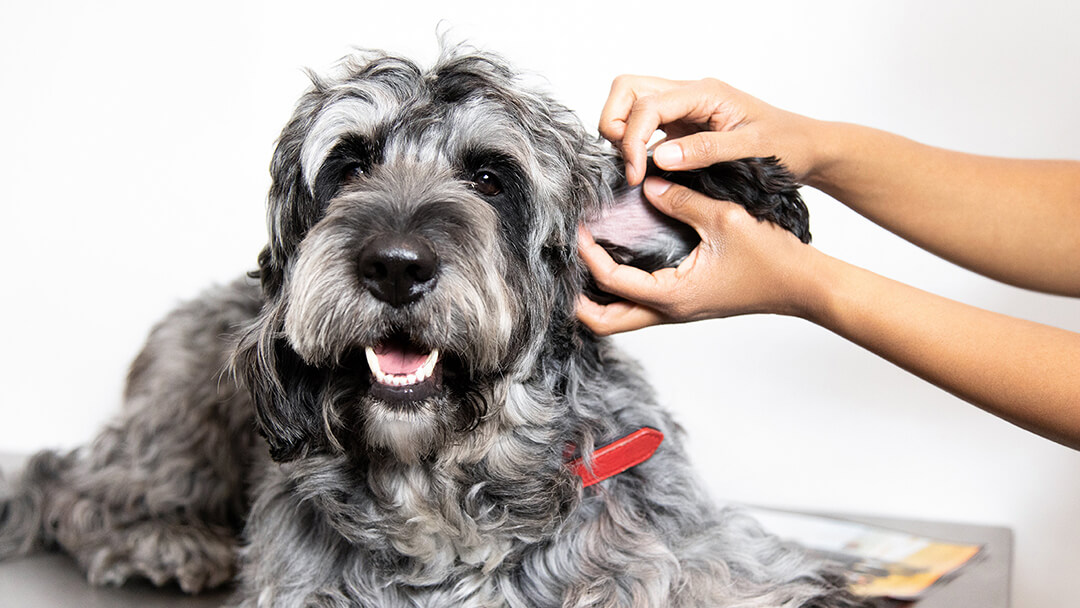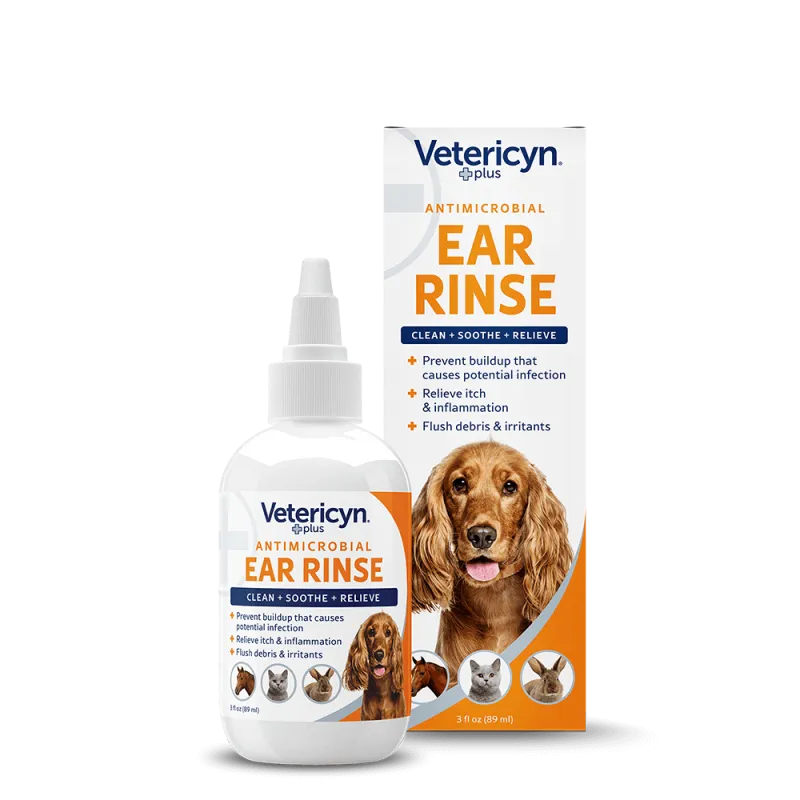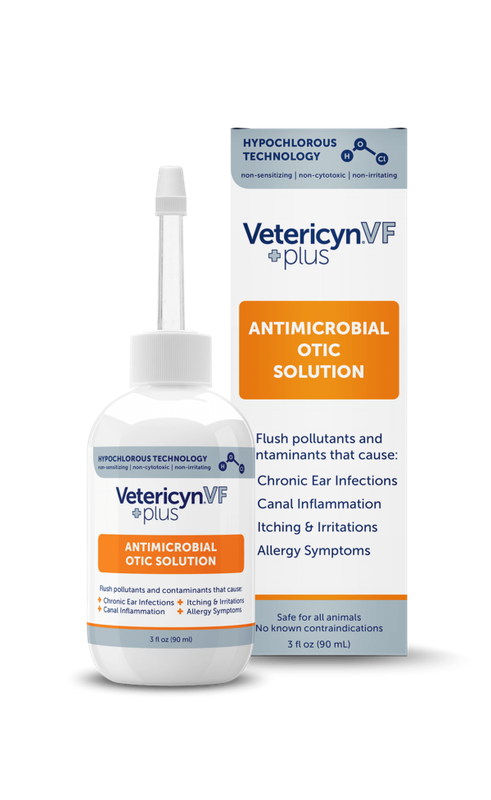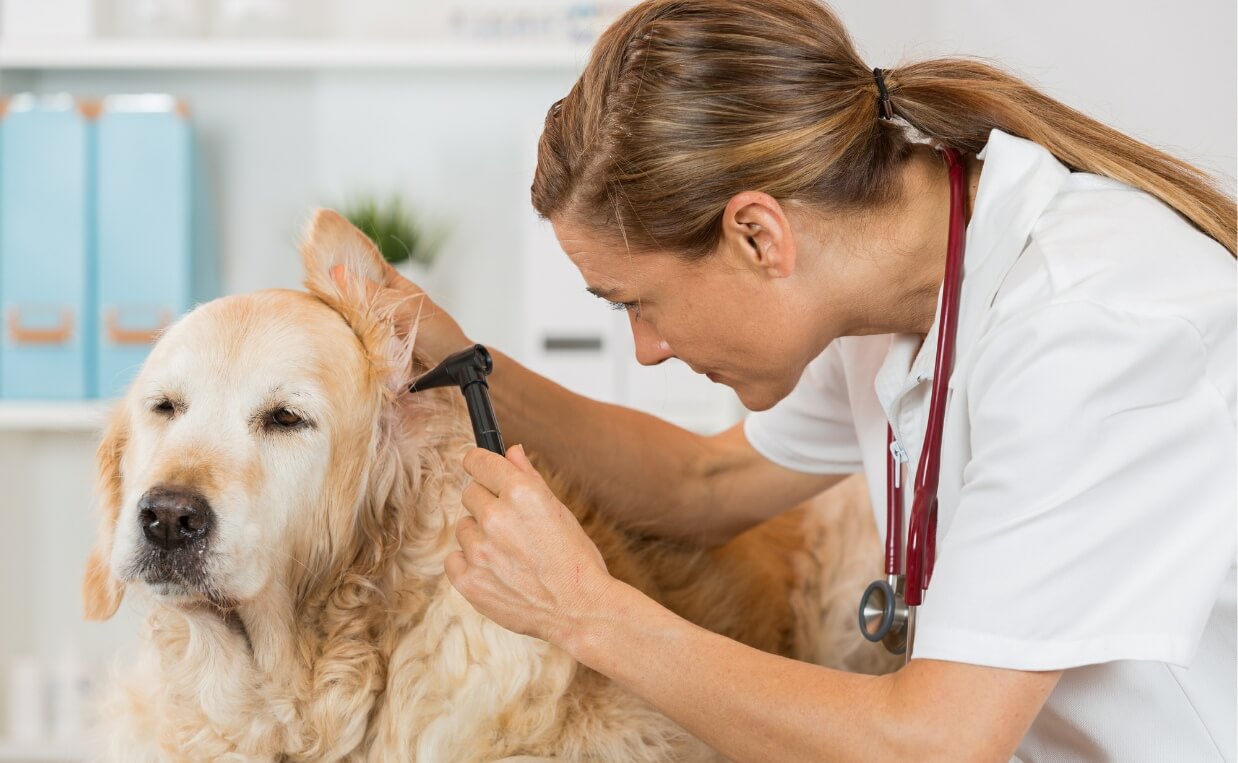Powered by Bestia Europe B.V.
6 Signs of Ear Mites in Dogs
Let’s face it: we all like to believe our four-legged friends are invincible to the troubles of the world. Why wouldn’t we? All we want is for them to be safe and happy.
Unfortunately, that’s not always the case. As they frolic around, our furry companions can pick up issues that cause discomfort. If your dog appears preoccupied with itchy ears, the culprit might be tiny creatures living in them: ear mites.
There are, of course, myriad issues and common ear problems in dogs that can lead to itching and scratching. So how can you tell if ear mites are causing your pup’s discomfort?
Read on as we outline six potential signs of ear mites in dogs and what you can do about them.
What Are Ear Mites?
Ear mites, or Otodectes cynotis, are tiny parasites that live in the ears of cats and dogs. While nearly invisible to the eye, they may sometimes appear as white specs. As unpleasant as it sounds, they survive by feeding on your pet’s ear tissue and blood.
The issue with ear mites is their highly contagious nature. Fortunately, there are clear signs to watch for, so you can address the problem promptly.
Let’s delve into the signs of ear mites.
Sign 1: Strong Odor
Dogs aren’t known for smelling particularly sweet, but their normal doggy scent is something most owners get used to. If you notice an unusually strong or bad smell coming from your dog’s ears, it’s worth investigating further.
Possible causes of foul ear odor include:
- Ear mites
- Secondary ear infections
- Lack of hygiene or the need for a bath
Keep in mind that one symptom alone isn’t always conclusive. Let’s explore additional signs of ear mites.

Sign 2: Excessive Scratching
It’s normal for dogs to scratch, but pay attention if your dog seems to be fixated on their ears. Excessive scratching can indicate irritation caused by ear mites. These pests provoke intense itching that dogs find difficult to ignore.
Excessive scratching can lead to:
- Cuts or abrasions
- Inflammation
- Secondary infections, such as yeast or bacterial infections
Monitor your dog closely and consult a veterinarian to confirm the presence of ear mites and begin appropriate treatment.
Sign 3: Constant Head Shaking
Dogs shake their heads frequently—to dry off, express themselves, or even as a reaction to certain sensations. But constant head shaking could signal an issue. If it’s accompanied by other symptoms, such as ear debris, a vet visit may be warranted.
Prolonged head shaking can result in:
- Hematomas (blood buildup in the ear flap)
- Additional discomfort and complications
Sign 4: Inflammation or Scratches
Look for redness, swelling, or visible scratches around your dog’s ears. Ear mites can cause significant irritation, leading to scabs, crust, and even hair loss around the ears. These visible signs are a strong indicator that something is amiss.
Sign 5: Ear Debris
Dark debris resembling coffee grounds in your dog’s ear is another telltale sign of ear mites. This material consists of wax, mites, and their waste. If you notice this, consult your veterinarian immediately.
Sign 6: Ear Discharge
Thick, dark discharge or fluid oozing from your dog’s ear indicates an advanced problem. While it might not always mean ear mites, it requires prompt medical attention to identify and treat the underlying cause.
What Causes Ear Mites in Dogs?
Ear mites are highly contagious and can be transmitted through:
- Infected Animals: Dogs often pick up mites during social interactions with other pets.
- Outdoor Environments: Tall grasses, forests, and bushes are common habitats for ear mites.
Treating Ear Mites
If you suspect ear mites, schedule an appointment with your veterinarian. They will:
- Perform a thorough ear examination using specialized tools like an otoscope
- Prescribe medications such as Vetericyn VF ear drops, ointments, or creams
- Address additional issues, such as wounds or hematomas, if necessary
Treatment typically spans several weeks to ensure the full lifecycle of the mites is eliminated. Follow your vet’s instructions closely for the best results.
Cleaning Your Home
While treating your dog, it’s essential to clean your home to prevent reinfection. Focus on:
- Furniture
- Bedding
- Blankets
- Floors
- Toys
Pay special attention to soft surfaces and areas your dog frequents.
Can Ear Mites Be Prevented?
Complete prevention may not be feasible, but you can reduce the risk of infection by:
- Avoiding areas prone to ear mites, like dense grass or wooded regions
- Regularly cleaning your dog’s ears to maintain hygiene and detect early signs of mites
The Sound of Healthy Ears—Vetericyn
Scratching, shaking, and bad odor all point to one common enemy—the ear mite. Luckily, becoming aware of the signs and risks of ear mite infection is the first step to ensuring your pup’s long-term health.
And as easy as it is to contract ear mites, it’s also straightforward to make ear care a regular part of your dog’s grooming routine.
If you’re looking for a safe, effective way to keep your dog’s ears clean, look no further than Vetericyn Plus® Antimicrobial Ear Rinse. Vetericyn offers safe options to keep your pet in good health, no matter their need.
Great for both routine ear care and helping alleviate irritation, Vetericyn Plus Antimicrobial Ear Rinse can help keep your four-legged best friend healthy during all stages of ear care.
Visit Amazon, Petco, Chewy to shop your favorite Vetericyn products today!
1. How do I know if my dog has ear mites? Watch for symptoms like itching, odor, and debris in their ears.
2. Can I treat ear mites at home? Always consult a veterinarian for proper diagnosis and treatment.
3. How often should I clean my dog’s ears? Routine cleaning promotes hygiene and can prevent problems, but don’t overdo it.
By staying vigilant and proactive, you can ensure your dog’s ears remain healthy and free of pesky mites.
Sources:
- PetMD. How to Get Rid of Ear Mites in Dogs. https://www.petmd.com/dog/conditions/infectious-parasitic/c_dg_ear_mites.
- PetMD. Ear Hematoma in Dogs. https://www.petmd.com/dog/conditions/ears/c_dg_dog_ear_hematoma.
- Purina. Ear Mites in Dogs: Symptoms and Treatment. https://www.purina.co.uk/articles/dogs/health/parasites/ear-mites-in-dogs.
- Brekke Veterinary Clinic. What Causes Ear Mites in Dogs and Cats? https://www.brekkevet.com/blog/what-causes-ear-mites-in-dogs-and-cats.
Refine by

Vetericyn Plus All Animal Ear Rinse
Vetericyn Plus All Animal Ear Rinse
Remove unwanted substances. Relieves itching and irritation. Cleanses ears and removes odor.
€13,18
Veterinarian Formula

Otic Care
Otic Care
Discover Vetericyn Plus VF Ophthalmic Wash: the most powerful solution for animal eye care and irritations.
€16,49
Free Shipping

Vetericyn "Senior Dog" Support Pack
Vetericyn "Senior Dog" Support Pack
Optimal care for senior dogs, mobility and rejuvenation, 100% safe and proven effective.
was €79,21
Save 17%
€66,07
Lowest price in 30 days: €79,21
Display prices in:EUR

